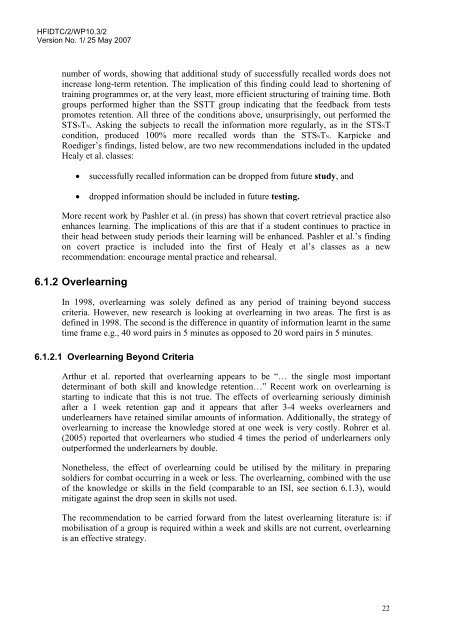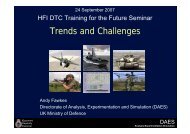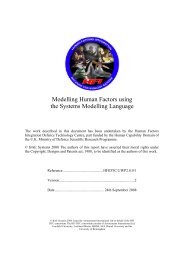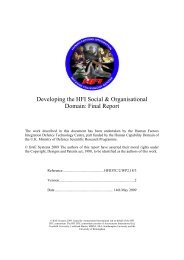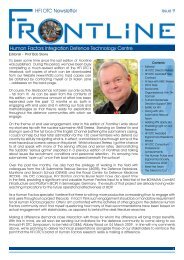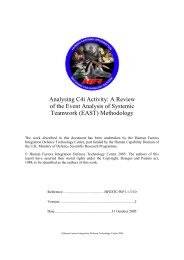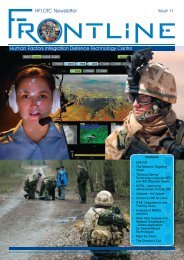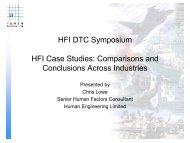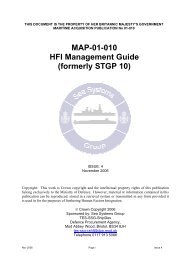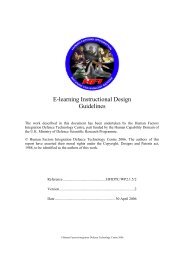Literature Review on Skill Fade - Human Factors Integration ...
Literature Review on Skill Fade - Human Factors Integration ...
Literature Review on Skill Fade - Human Factors Integration ...
You also want an ePaper? Increase the reach of your titles
YUMPU automatically turns print PDFs into web optimized ePapers that Google loves.
HFIDTC/2/WP10.3/2<br />
Versi<strong>on</strong> No. 1/ 25 May 2007<br />
number of words, showing that additi<strong>on</strong>al study of successfully recalled words does not<br />
increase l<strong>on</strong>g-term retenti<strong>on</strong>. The implicati<strong>on</strong> of this finding could lead to shortening of<br />
training programmes or, at the very least, more efficient structuring of training time. Both<br />
groups performed higher than the SSTT group indicating that the feedback from tests<br />
promotes retenti<strong>on</strong>. All three of the c<strong>on</strong>diti<strong>on</strong>s above, unsurprisingly, out performed the<br />
STSNTN. Asking the subjects to recall the informati<strong>on</strong> more regularly, as in the STSNT<br />
c<strong>on</strong>diti<strong>on</strong>, produced 100% more recalled words than the STSNTN. Karpicke and<br />
Roediger’s findings, listed below, are two new recommendati<strong>on</strong>s included in the updated<br />
Healy et al. classes:<br />
• successfully recalled informati<strong>on</strong> can be dropped from future study, and<br />
• dropped informati<strong>on</strong> should be included in future testing.<br />
More recent work by Pashler et al. (in press) has shown that covert retrieval practice also<br />
enhances learning. The implicati<strong>on</strong>s of this are that if a student c<strong>on</strong>tinues to practice in<br />
their head between study periods their learning will be enhanced. Pashler et al.’s finding<br />
<strong>on</strong> covert practice is included into the first of Healy et al’s classes as a new<br />
recommendati<strong>on</strong>: encourage mental practice and rehearsal.<br />
6.1.2 Overlearning<br />
In 1998, overlearning was solely defined as any period of training bey<strong>on</strong>d success<br />
criteria. However, new research is looking at overlearning in two areas. The first is as<br />
defined in 1998. The sec<strong>on</strong>d is the difference in quantity of informati<strong>on</strong> learnt in the same<br />
time frame e.g., 40 word pairs in 5 minutes as opposed to 20 word pairs in 5 minutes.<br />
6.1.2.1 Overlearning Bey<strong>on</strong>d Criteria<br />
Arthur et al. reported that overlearning appears to be “… the single most important<br />
determinant of both skill and knowledge retenti<strong>on</strong>…” Recent work <strong>on</strong> overlearning is<br />
starting to indicate that this is not true. The effects of overlearning seriously diminish<br />
after a 1 week retenti<strong>on</strong> gap and it appears that after 3-4 weeks overlearners and<br />
underlearners have retained similar amounts of informati<strong>on</strong>. Additi<strong>on</strong>ally, the strategy of<br />
overlearning to increase the knowledge stored at <strong>on</strong>e week is very costly. Rohrer et al.<br />
(2005) reported that overlearners who studied 4 times the period of underlearners <strong>on</strong>ly<br />
outperformed the underlearners by double.<br />
N<strong>on</strong>etheless, the effect of overlearning could be utilised by the military in preparing<br />
soldiers for combat occurring in a week or less. The overlearning, combined with the use<br />
of the knowledge or skills in the field (comparable to an ISI, see secti<strong>on</strong> 6.1.3), would<br />
mitigate against the drop seen in skills not used.<br />
The recommendati<strong>on</strong> to be carried forward from the latest overlearning literature is: if<br />
mobilisati<strong>on</strong> of a group is required within a week and skills are not current, overlearning<br />
is an effective strategy.<br />
22


